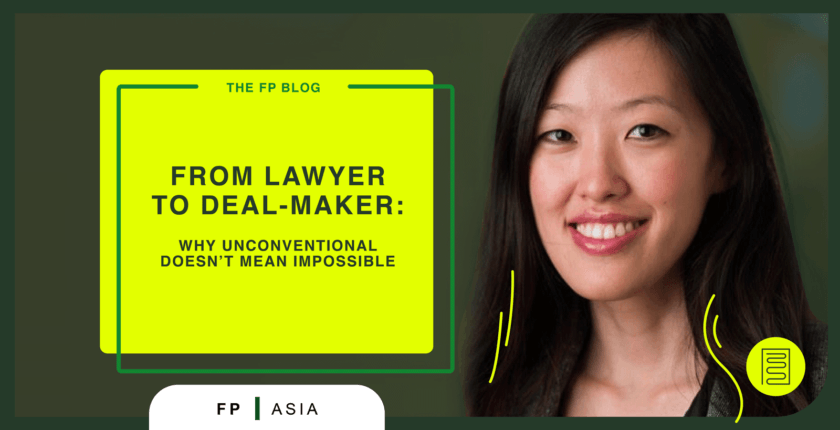Latest Insights
January 9, 2019
In this Funds Partnership Asia exclusive interview with Melissa Heng, Vice President at General Atlantic, who helped establish the firm’s Southeast Asian business in 2011 and lead the firm’s investments in Technology across the region. Gain insights through an in-depth look into her journey from an unconventional background into the world of Private Equity.
1. Could you tell us more about your journey? What were you doing previously, and how did you end up in Private Equity (PE)?
My first degree is actually in law, so my journey is an unconventional one. The first job I landed right out of university was an associate position at a law firm. I started off as a corporate finance lawyer, moving to investment banking, before finally joining General Atlantic (GA).
As a lawyer, I worked very closely with investment bankers on M&A and capital markets transactions. The hours were long and rigorous and I did not have much passion for the job.
My introduction to this industry really came from my time interacting with the bankers, which gave me good exposure to the business side of the deals I worked on. I was intrigued and felt that their work was much more interesting than the practice of law, and given my personality, felt that I would thrive in such an environment. With the goal of a change in careers, I decided to study for the CFA (successfully completing the level 1 CFA course) whilst I was still practicing law.
Fast forward a year or so, I made the jump to investment banking at Macquarie Group through a friend’s referral. In my new role, I mainly focused on capital markets and M&A transactions in the TMT space, and helped the bank to help establish their TMT practice in Dubai.
After my stint in investment banking for almost two years, I went on to do an MBA at INSEAD, and joined GA right after graduation in 2011. It was quite a strategic opportunity, as they were just opening their offices in Singapore to cover Southeast Asia and had actually reached out to me me after seeing my CV in the Private Equity club CV book they received from my business school. Thankfully, all my past experiences paid off and I became their first local hire.
Since then, I have been in private equity for over 7 years with a focus on technology and consumer-facing businesses in Southeast Asia and Australia & New Zealand. I haven’t looked back since!
2. From law to investment banking and finally to private equity, were there times where you felt that your technical knowledge was inadequate? If so, how did you overcome this gap in knowledge?
To be frank, the transition from law to investment banking was probably the hardest transition. As you may know, lawyers don’t really work much with numbers. Prior to banking, I had never even opened up an excel sheet during my time practicing law. I had to pick up most of my skills on the job, but studying for the CFA put me in good stead to do so.
More importantly, it also showed the investment bank my interest in finance and willingness and determination to put in whatever was required to make the career switch.
In addition, I also developed my investment skillset in business school by signing up for the relevant classes and by taking on the role of President of the Investment Management club, where I helped manage the school’s fund allocation. This resulted in a much easier transition from investment banking into private equity.
To enter into private equity, financial knowledge is a must. Most private equity firms require their entry level hires to be proficient in financial modelling and to be familiar with corporate finance. Any candidate without the prerequisite background will struggle with the technical case studies during the interview process.
My advice to potential candidates with no technical background would be to start early, pick up as much financial knowledge as possible before attempting to transition into private equity. For example, go for industry courses, certification programs like the CFA, financial modelling courses like ‘Training The Street’, do an MBA, and read up about investing in general. It is extremely difficult to jump straight into Private Equity without first having some sort of financial training, hence I would highly recommend starting out first in investment banking due to:
1. The higher number of positions available compared to private equity roles
2. Relevant work experience, foundational knowledge and technical training
3. How difficult is it to apply traditionally into private equity? Do you think your network of connections played a part in your successful jump into the industry?
Naturally, having a network always helps. I would definitely recommend anyone who has contacts within the industry to first leverage on those contacts.
Never underestimate an endorsement from someone already in the industry.
Likely, they would already have made a judgement as to your fit for the job and communicated it accordingly.
Even without relevant contacts, seeking out recruitment agencies with strong relationships in the industry (such as Funds Partnership Asia) is always a good way to get an understanding of, and take advantage of, the opportunities available in the market.
4. Did your previous experience as a lawyer differentiate you from the other candidates? Were there any soft skills which were transferrable that gave you an edge?
I think that being a lawyer (in particular with my transition to banking) definitely differentiated me from the other candidates during the hiring process. Two things which helped me stand out were:
1. Resilience and drive – My transition to banking highlighted my drive and determination to proactively do whatever was required to achieve my goals, which in this case involved months of self-motivated study on top of my long working hours in law.
2. Problem-solving mindset – The logical thought process and problem-solving skillset that law cultivates in you does help in dealing with complex deal situations. Familiarity with transaction documentation and regulation during the deal process is also a bonus.
Keep in mind that private equity is a long-term career choice, given the long investment cycle.
Hence, many firms do prefer to hire candidates who have the potential and soft skills required to grow in their roles. Generally, what I look out for when hiring other than solid technical skills is: Is the person driven or self-motivated? Does he or she have a passion for investing? Does he or she have good commercial sense? Can he or she connect well with entrepreneurs or have the potential to do so? It would be useful to think of how you can appeal to recruiters with this mindset.
5. Would fresh graduates be considered by private equity firms? If not, what about candidates with at least a few years of experience? What specifically are recruiters looking out for?
Unfortunately, the short answer is that most global firms don’t hire fresh graduates. However, there is no harm in trying your luck with other outfits!
For candidates with prior work experience, we generally prefer those with investment banking or some sort of financial background. Candidates with consulting backgrounds are also considered, but they would need to have some corporate finance exposure. For example, they would have to have worked in the corporate finance division of the consulting firm, or otherwise show that they have personally taken it upon themselves to build their financial modelling skillsets.
As mentioned before, the bottom line is that if you don’t come from a traditional background of investment banking, you will have to show that you have proactively developed the relevant skillsets!
Another obvious but little-heeded advice is to come prepared! You would be surprised at the number of people who have come into interviews with me unprepared. Come prepared to discuss topics relevant to the industry such as fund strategy or current trends in the industry. If you have highlighted certain deals on your CV, be sure to know how to engage the interviewer on the specifics of those deals in a way that is relevant to private equity – from an investor’s point of view.
Speaking of CVs – I would much rather see a few deals in which the candidate has played a significant role in and which he or she can elaborate upon, rather than a list of deals which the candidate may have helped out in one way or another but is unable to dig deep on.
Within investing there are many types of investment strategies such as buyout, growth or venture capital, and each of these asset classes have personality types and skillsets which better suit the particular industry. You need to understand these differences and ask yourself if this (asset class) is something that you are really suited for and position yourself accordingly.
6. How is the lifestyle and work-life balance in private equity compared to when you were practicing law?
Generally, I have much more control over my time in private equity than in law or banking. Lawyers and bankers act as advisors to their client on transactions, so they are bound by timelines predetermined by the client and have to work round the clock to meet them. The general day-to-day in private equity is much more varied, with a mix of origination, execution and portfolio management. Of course, during a live deal, the hours are just as bad whether in Private Equity, law or banking as everyone (whether principal or adviser) is working towards the same finish line.
7. Given the rising trend in outsourcing, do you think that job security in this industry will be a concern?
I don’t think outsourcing will impact private equity the same way as it will impact public market investing. There is just so much human interaction and relationship building required with the entrepreneurs and management teams that you cannot outsource. Even for entry level associates, a large part of their responsibilities include building the business case and returns forecast, which requires them to work with management to understand the underlying data.
8. Many people think that private equity is a very glamourous occupation, and many associate a career in private equity with the notion of carried interest. Is it really what people think it is?
The prospect of carry is definitely attractive as it can amount to a substantial portion of your long-term compensation. That said, I don’t think it should be the main motivation for people looking to enter into the buy side, because in most closed-end funds you only receive carry after the fund winds up (which can take over 10 years). Additionally, it is not automatic – carry vests over a number of years and there can be hurdles and even claw-back provisions affecting carry distribution.
Monetizing carry is a very long-term endeavor and many investors leave their funds before they receive any sort of carry payout. The bottom line is that it’s important to come into the industry with the right mindset and a passion for investing.
9. What is the best part about being in private equity?
What I really love about my job is that I am constantly learning, and that the industry pushes me to be the best that I can be. I enjoy learning about new business models, particularly in technology, the sector I spend most of my time in. I do look at deals across other sectors as well and I enjoy that just as much as it allows me to develop perspectives on how technology can add value to companies operating in more traditional industries.
I also love spending my time interacting with highly capable and passionate entrepreneurs and management teams and strive to be a partner to them.
This pushes me to want to be on top of my game so that I can bring as much value to the relationship as possible to earn their respect and trust.
All in all, being in this industry means that you’re intimately aware of all the developments in the sector. I’ve seen the evolution of technology from being a non-existent sector in Southeast Asia to the booming sector that it is today. It has been really exciting to be a part of that and a real privilege to be able to follow all these entrepreneurs on their journeys.
If you are interested to make a mid-career switch or pursue a career in funds management, do send your queries to ayyaz@fundspartnership.com and we will be in touch shortly!
Share This Article
Articles You May Like















